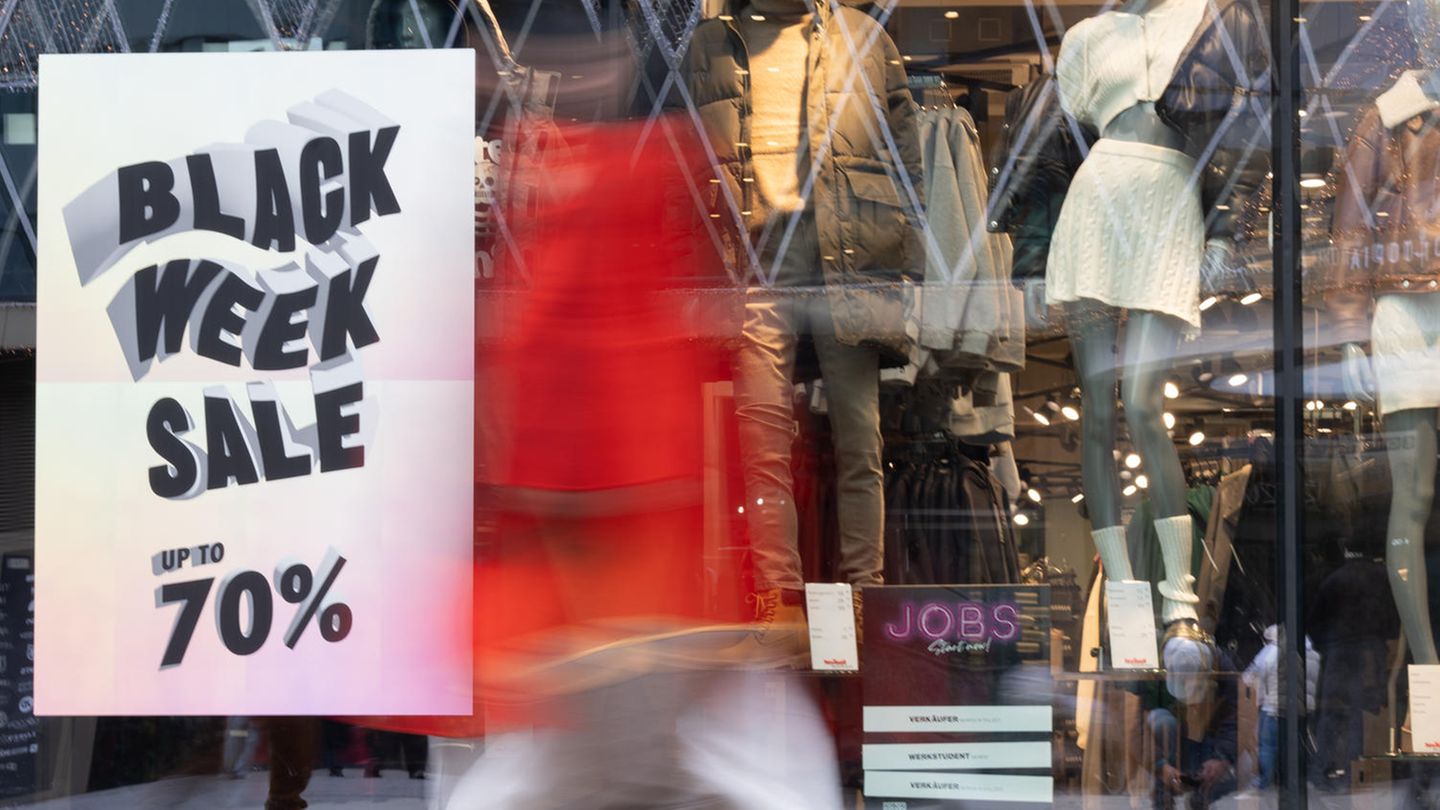Bargain hunting interview
Black Friday: You should know these brazen tricks from retailers
Copy the current link
By Black Friday at the latest, many customers become bargain hunters. But online retailers in particular are shamelessly exploiting this. What are the pitfalls? Call consumer protection.
Ms. Steinbach, why do customers complain to you most often?
By far the most common concerns are products that do not meet expectations. Example: The customer buys a high-priced coat. At least that’s what the product looks like in the photos – nice fabric, rich colors. What the customer then receives has nothing to do with that. Sometimes the color is wrong, the model is completely different or the product looks as if it cost 2.50 euros to produce.
How often does something like this happen?
Every day and these complaints mostly concern goods from Asia.
And then?
… there are massive problems with the right of withdrawal. Customers often don’t know who to contact or who they are dealing with because there are no names in the legal notice, there is no service portal and there are no contact addresses. Sometimes the shop operator is based in the EU, but the goods come from the Far East. Withdrawal is systematically made more difficult, so that consumers end up stuck with the goods. If a return address is specified, the return shipping costs 40 to 50 euros because the products are going back to Hong Kong, for example. It is also questionable whether you will see your money again afterwards.
Andrea Steinbach is a consumer law and digital lawyer. At consumer protection in Rhineland-Palatinate, she looks after the complaints mailbox where customers express their anger about products and companies. Consumers particularly often complain about platforms and retailers from Asia, says Steinbach
How helpful is the legal route?
The shops are located in other EU countries. Our German and EU rights do not apply there. Unfortunately that is the case. You can of course file a complaint against fake shops from which the goods never arrive. That would be an act of fraud. But even then, law enforcement is rarely successful.
Has online retail become bolder and more aggressive?
In any case! There are fewer fake shops, i.e. shops without warehouses that simply collect money from customers but never send out the promised products. But our main problem today is goods that are much inferior than what is portrayed online. Shop operators are becoming increasingly clever.
Are there phases in which online retailers act more aggressively? For example before Christmas?
Whenever there are discount battles. This usually happens around Black Friday and yes, even before Christmas. Since the Temu platform came into being, the trend has become even more pronounced.
Running in against Temu EU procedure because of manipulative purchasing incentives, so-called dark patterns.
This trend has increased massively in the last two years since I started working at the consumer advice center. Fortunately, there are legal requirements such as the Digital Service Act (DSA) that prohibit such manipulative designs.
Does that help?
When it comes to dark patterns, the law is worded very vaguely. There are many loopholes and they are used. Temu in particular relies on competitions and countdowns that show how many products are still available and how long the offer is supposedly still available.
Write down what you really need. And think about whether you really need something or are just shopping because of Black Friday
Do you think the case against Temu will be successful?
The authorities can do something with the DSA and other EU laws and regulations. But dark patterns are a new trend that first has to be shaped by jurisdiction and national laws. However, the consumer advice center has had good experiences with Temu. The federal association has warned the platform because of misleading discounts and manipulative designs. The company then issued a statement committing itself to refraining from these violations. Temu obviously wants to expand its market here in Europe. Of course, if it intentionally violates European laws, that doesn’t make a good impression.
What advice would you give consumers during Black Friday week and when shopping for Advent?
When pressure is applied, many people tend to react hastily and make decisions that we can no longer influence rationally. The best thing to do is to go back to the good old shopping list. Write down what you really need. And think about whether you really need something or are just shopping because of Black Friday.
If you know what you want, you should compare the prices on comparison portals, for example Idealo or Günstiger.de. It’s always best to use several comparison portals. And keep an eye on prices before Black Friday week! Not that you think everything is cheap on Black Friday – it’s not. In addition, it may be useful to do your own short research. Take a look at the imprint or enter the name of the shop in the fake shop finder. Are there reviews and testimonials in forums? This is how you find out whether the store is really reputable.
That sounds very complicated. How many people bother?
Unfortunately too few, otherwise there would be significantly fewer complaints about fake and Asian shops. But two comparison platforms are quickly served. Consumers often already know the cheapest shops. The consumer advice center recommends shopping in brick-and-mortar stores. But Black Friday is driven by online retail and that’s why most people shop online.
Which are the most brazen providers, apart from Temu?
In addition to Temu, Shein is also at the forefront when it comes to prices. Jackets for five euros or shoes for seven euros – of course you can’t expect first-class goods. But when it comes to consumer rights, delivery times and returns, we don’t get any complaints about Temu.
There will always be manipulative designs to pressure customers into buying
However, the platform often generates negative headlines.
One can criticize the design of the website because of the many dark patterns. You should also think about data protection. And Temu is not as sustainable as it presents itself. But otherwise we don’t get any complaints.
Then there are surely other problem children?
Many customers complain about the online shop Veramodehaus.de because of classic problems: the right of withdrawal is made more difficult, there is a Dutch address in the legal notice. If you want to return the goods, you will be required to send them to China. Customers have to pay the postage themselves and usually exceeds the value of the goods.
There are also frequent complaints about the retailer Orthoback.de, which sells orthopedic and barefoot shoes. Consumers complain about inferior products and poor customer service. The return shipping costs to China must be borne by yourself.
But doesn’t the Digital Service Act apply?
This only applies to platforms where retailers can register and sell their goods. Temu does not sell goods, but provides the playground. Vera Modehaus or Orthoback are online shops. The web addresses end in .de. Anyone who addresses customers on the EU market with a European URL must comply with local laws. But many retailers simply don’t do it. We cannot punish such legal violations because, for example, Orthoback is based in Dubai.
Will that change in the future?
That’s hard to say.
Do customers complain more often about platforms or online shops?
Actually more often via the shops.
What will online buyers have to prepare for in the future?
There will always be manipulative designs to pressure customers into buying. Many retailers now advertise via social media such as Tiktok or Instagram. Young people often deal with this in a naive way. For 14 to 18 year olds or even young students, the clothes are cheap and then they can order straight away. In addition, the online shopping experience is more often controlled with AI. Purchasing online is therefore becoming more and more individually tailored to customers. You have to be aware of all of this and not allow yourself to be put under pressure immediately. In the best case scenario, you get a night’s sleep before you finally decide to buy something online.
Source: Stern







